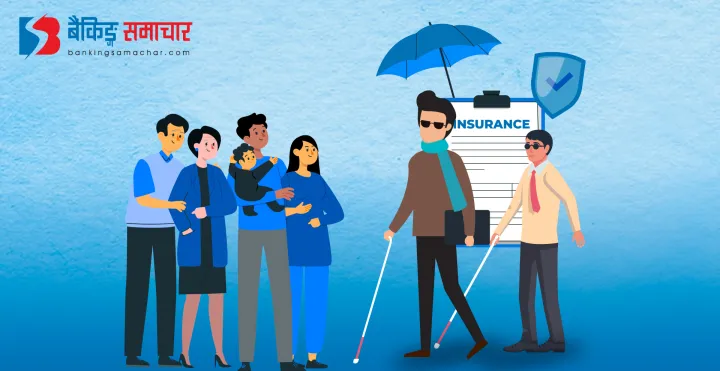KATHMANDU – Many young people are drawn to the insurance sector, finding it an attractive field for employment, particularly as agents and surveyors. The insurance industry is one of the major employment-generating sectors. However, there has been little to no involvement of blind individuals in this field. If blind individuals wish to become insurance agents, the regulatory body, the Insurance Authority, has now made provisions for their inclusion. The authority has approved all companies to implement this arrangement.
Shusheel Dev Subedi, Director of the Nepal Insurance Authority, states that if blind individuals are interested in working in the insurance sector, they can do so according to their qualifications and the company’s rules. He told Banking News that every citizen with Nepali citizenship can work as an agent in the insurance sector.
He added that this system could be very fruitful, as it allows blind individuals to work and contribute significantly to society. Additionally, he mentioned that blind individuals pursuing a career as insurance agents would send a strong message on an international level.
He said, “Anyone can work in the insurance sector, and insurance companies cannot reject blind individuals who are eager to work. This is a positive change and a good development for the insurance sector when blind individuals are keen to participate. Nothing prevents blind individuals from becoming agents. The authority’s regulations set equal qualifications for everyone, including the blind. Anyone can be appointed according to the rules and qualifications.”
Declining Employment in the Insurance Sector
In the fiscal year 2078/79, 12,031 people were directly employed in the insurance sector. However, in the fiscal year 2079/80, this number decreased to 11,496, marking a decline of 4.45 percent in employment within the insurance sector over one year.
Stakeholders estimate that this decline in employment may be due to the policy of mergers and acquisitions among insurance companies. Insurance intermediaries also play a crucial role in the industry, with insurance agents and surveyors being the main intermediaries. In 2078/79, there were 296,403 insurance agents involved in the insurance business, but this number decreased by 6.33 percent to 277,626 in 2079/80.
Similarly, in 2078/79, 1,240 insurance surveyors were active in the insurance business. The Insurance Authority’s data shows that this number also declined by 1.85 percent, dropping to 1,217 in 2079/80.
Insurance Companies Can Employ Blind Individuals if They Choose
The decision to appoint someone as an insurance agent lies with the insurance companies. Since agents work for these companies, it is up to the companies to decide who to hire. However, given the low participation of blind individuals, their involvement could benefit the insurance market. Sunil Vallabh Pant, Chief Executive Officer of NLG Insurance Company, mentioned this in a conversation with Banking News.
He stated that the company is exploring ways to employ blind individuals and how to reliably include customers in insurance. “There is no reason why the Insurance Authority should not approve it. Insurance companies should also give them an opportunity,” he added, sharing a personal anecdote: “A blind friend of mine is more technologically savvy than I am.”
“We Can’t Insure Ourselves, So How Can We Insure Others?”
Antak Khatiwada, Chairman of Disability Protection Nepal, acknowledged that while it is positive for the insurance sector that blind individuals are interested in working in it, there is currently a provision that prevents blind individuals from obtaining life insurance for themselves. He said, “Even if the Insurance Authority and the insurance companies allow us to work as insurance agents, there is no provision for us to insure ourselves.”
“We are the ones who most need insurance, yet we are deprived of this right. Our disabled community objects to this,” he added. “If arrangements are made for us to obtain insurance, or if we are interested in working in the insurance sector without being discriminated against by the relevant agencies, we would be more enthusiastic about working in this field.”



 About Us
About Us
Comment